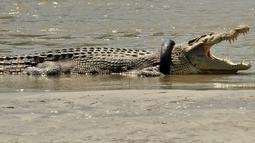
The existence of crocodiles in the area of Palu River, which is currently a hot conversation in the community, is actually not new. The existence of this crocodile, allegedly been in the area of the river hammer, since hundreds of years ago.
Central Sulawesi Community Historia Coordinator (KHST), Moh Herianto, Monday (22/1/2018) said that the habit of people who live around the Palu River, to give offerings on the river, is one proof, that up to now, people still trust a number of mythical stories about the existence of crocodiles in the river.
"Mythical stories are evolving, such as the human crocodile twins or white crocodile myths, which circulate in the community, allegedly appeared before the colonial era," said Anto, greeting familiar.
The oldest evidence in the form of photos Anto said, so far is a photograph of a large estuary crocodile capture, which is allegedly a crocodile named La Goroba by the community around the river Palu, in 1935. The photograph perpetuated by Theodore van Ardenne contains La Goroba pose captured successfully by a German descendant in Palu named John Fischer, otherwise known as Mr. Fischer's call. John Fischer is known to catch La Goroba with his son, Tossy Fischer.
Theodore van Ardenne captured two photographs of Mr. Fischer's pose sitting on the back of La Goroba, witnessed by the people around the Palu River, precisely in Bungi area (now New Kelurahan, Palu Barat Subdistrict), then the second pose when the belly of La Goroba is split and there is a slice the human body in it.
The presence of La Goroba itself is believed by the public in contact with the mystical things. La Goroba name pinned on the crocodile estuary is large, because it is said, with a large size, La Goroba able to destroy a sand cart. John with Tossy Fischer too, when paralyzing La Goroba, called using a gold-coated bullet, because La Goroba is believed to be not common crocodile.
Anto rate, the existence of crocodiles in the river Palu, should be a serious concern, because the population from time to time continues to grow. He said, if the population increases and the amount of food supply is reduced, this will be a time bomb for people who live in the area of the banks of the Palu River.
"The government has time to think about how to breed the crocodile population in the Palu river, because in this river there is also community livelihood activities, such as sand miners," he said.